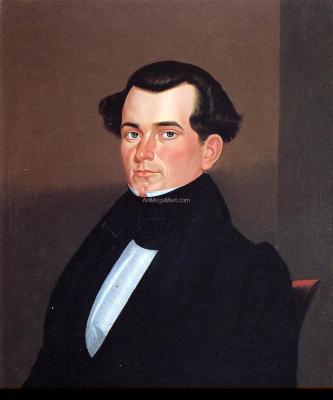Life Experience
James Sidney Rollins was born an only son in Kentucky in 1812. His grandparents, a well-known physician and his wife, both died the same year he was born. He was educated at the Richmond Academy in Kentucky, and at fifteen, he entered the sophomore class of Washington College in Pennsylvania. During his senior year in the fall of 1829, he accompanied Andrew Wylie, ex-president of Washington College, to Bloomington, Indiana. Mr. Wylie had just been elected the first president of Indiana College (now IU). Rollins entered the senior class of Indiana College (now IU) and graduated in October 1830 at the age of seventeen. He was a member of the inaugural graduating class of Indiana College.
During the Black Hawk War in 1832, Rollins served as a major and aide-de-camp to Major General Richard Gentry. In 1833, Rollins received a master’s degree “in course” (representing distinguished success in society but requiring no additional work at the university) from Indiana College (now IU). He then studied law at Transylvania University in Lexington, Kentucky. He received his Doctor of Laws degree from there in 1834.
Rollins then moved to Missouri to pursue a law practice and farming. Beginning in 1836 and continuing for several years, he edited the Columbia Patriot. In 1845, his father, Anthony, died in Missouri. From 1838 to 1861, he was a state legislator of Missouri. In 1856, his mother, Sallie, died in Missouri. For sixteen years, he represented Boone County and was a Senator in the Missouri General Assembly. In 1848 and 1857, he was the Whig candidate for governor of Missouri.
For the rest of his life, Rollins was an advocate for common school education by the States. He authored and secured the passage of the bill which located the University of Missouri in Boone County. He was a steadfast friend of the University of Missouri from then on. For fifteen years, he was president of the University of Missouri’s Board of Curators.
During the Civil War, Rollins was commissioned as colonel of a volunteer regiment of the Union Army by Governor H. R. Gamble. Having just been elected to the 37th U.S. Congress, Rollins did not serve during the war. Although born in the South and representing the strongest slave district in Missouri, he advocated and voted for the 13th Amendment to the U.S. Constitution, which abolished slavery and involuntary servitude. He also assisted President Lincoln in his efforts to put down the Great Rebellion.
Rollins was a U.S. Representative from 1861 to 1865. He introduced a bill to build a transcontinental railroad (the Pacific Railway Acts), and he advocated for the Morrill Act of 1862. This act would give large grants of land for the benefit of agricultural and mechanical colleges in the different States. In 1863, he was a witness of the Quantrill Raid in Kansas.
After leaving Congress, Rollins again became a member of the Missouri State Legislature, from 1865 to 1872. He authored and secured the passage of the educational act of February 24, 1870, which made the agricultural and mechanical college a department of the state university. Although it was a logical consequence of the national Morrill Act, it had taken four years to pass against violent opposition. In 1870, he also helped fund and establish the School of Mines at Rolla (now the Missouri University of Science and Technology), helped to liquidate its debt and complete the Science Building, and set maximum university tuition at ten dollars, which helped bring in students.
Rollins helped create the University of Missouri in 1872. To this day, he holds the honorary title of “Pater Universitatis Missouriensis, the Father of the University of Missouri.” He received an honorary Doctor of Laws degree from IU in 1872. He resided in the city of Columbia in Boone County, Missouri, at the time of his death.
Marriage and Family
In 1837, Rollins married Mary Elizabeth Hickman. Their first child died before her second birthday. In 1860, he and Mary Elizabeth had their eighth child. Eight of his eleven children survived him.
Interesting Anecdote
Rollins twice defied lynch mobs targeting his Black clients for lynching; he cut the noose from around their necks and secured their safety until their trials were finished. He abstained from alcohol and was a lifelong proponent of temperance.


